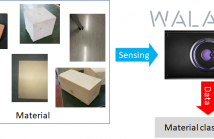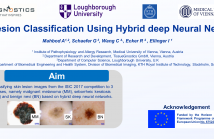
ICASSP is the world’s largest and most comprehensive technical conference focused on signal processing and its applications. The 2019 conference will feature world-class presentations by internationally renowned speakers, cutting-edge session topics and provide a fantastic opportunity to network with like-minded professionals from around the world. Visit website.

- Read more about Robust Bayesian Beamforming for Sources at Different Distances with Applications in Urban Monitoring
- Log in to post comments
Poster for "Robust Bayesian Beamforming for Sources at Different Distances with Applications in Urban Monitoring".
https://ieeexplore.ieee.org/document/8682835
poster.pdf
- Categories:
 20 Views
20 Views
- Read more about DISTRIBUTED DIFFERENTIALLY-PRIVATE CANONICAL CORRELATION ANALYSIS
- Log in to post comments
We propose a distributed differentially-private canonical correlation analysis (CCA) algorithm to use on multi-view data. CCA finds a subspace for each view such that projecting the views onto these subspaces simultaneously reduces the dimension and maximizes correlation. In applications involving privacy-sensitive data, such as medical imaging, distributed privacy-preserving algorithms can let data holders maintain local control of their data while participating in joint computations with other data holders.
- Categories:
 25 Views
25 Views
In this paper, we present our novel approach to the 6th Dialogue State Tracking Challenge (DSTC6) track for end-to-end goal-oriented dialogue, in which the goal is to select the best system response from among a list of candidates in a restaurant booking conversation. Our model uses a convolutional neural network (CNN) for semantic tagging of each utterance in the dialogue history to update the dialogue state, and another CNN for predicting the best system action template.
icassp19.pdf
- Categories:
 21 Views
21 Views
- Read more about Minimum-Volume Rank-Deficient Nonnegative Matrix Factorizations
- Log in to post comments
In recent years, nonnegative matrix factorization (NMF) with volume regularization has been shown to be a powerful identifiable model; for example for hyperspectral unmixing, document classification, community detection and hidden Markov models. We show that minimum-volume NMF (min-vol NMF) can also be used when the basis matrix is rank deficient, which is a reasonable scenario for some real-world NMF problems (e.g., for unmixing multispectral images).
- Categories:
 38 Views
38 Views
- Read more about An Enhanced Hierarchical Extreme Learning Machine with Random Sparse Matrix Based Autoencoder
- Log in to post comments
Recently, by employing the stacked extreme learning machine (ELM) based autoencoders (ELM-AE) and sparse AEs (SAE), multilayer ELM (ML-ELM) and hierarchical ELM (H-ELM) has been developed. Compared to the conventional stacked AEs, the ML-ELM and H-ELM usually achieve better generalization performance with a significantly reduced training time. However, the ℓ1-norm based SAE may suffer the overfitting problem and it is unable to provide analytical solution leading to long training time for big data.
- Categories:
 95 Views
95 Views
- Read more about Progressive Filtering for Feature Matching
- Log in to post comments
In this paper, we propose a simple yet efficient method termed as Progressive Filtering for Feature Matching, which is able to establish accurate correspondences between two images of common or similar scenes. Our algorithm first grids the correspondence space and calculates a typical motion vector for each cell, and then removes false matches by checking the consistency between each putative match and the typical motion vector in the corresponding cell, which is achieved by a convolution operation.
poster11.pdf
- Categories:
 30 Views
30 Views
- Read more about Minimax Magnitude Response Approximation of Pole-radius Constrained IIR Digital Filters
- Log in to post comments
Design of infinite impulse response (IIR) digital filters to approximate some desired magnitude-frequency response is a classical research topic in signal processing. When a pole radius constraint is imposed, however, the problem becomes challenging and few solution methods are available. This paper converts the magnitude-response approximation problem into another problem that approximates the desired magnitude response and an accompanied phase response simultaneously.
- Categories:
 17 Views
17 Views
- Read more about MATERIAL IDENTIFICATION USING RF SENSORS AND CONVOLUTIONAL NEURAL NETWORKS
- Log in to post comments
Recent years have assisted a widespreading of Radio-Frequency-based tracking and mapping algorithms for a wide range of applications, ranging from environment surveillance to human-computer interface.
poster.pdf
- Categories:
 22 Views
22 Views
- Read more about AN INTERACTION-AWARE ATTENTION NETWORK FOR SPEECH EMOTION RECOGNITION IN SPOKEN DIALOGS
- Log in to post comments
Obtaining robust speech emotion recognition (SER) in scenarios of spoken interactions is critical to the developments of next generation human-machine interface. Previous research has largely focused on performing SER by modeling each utterance of the dialog in isolation without considering the transactional and dependent nature of the human-human conversation. In this work, we propose an interaction-aware attention network (IAAN) that incorporate contextual information in the learned vocal representation through a novel attention mechanism.
- Categories:
 42 Views
42 Views
- Read more about SKIN LESION CLASSIFICATION USING HYBRID DEEP NEURAL NETWORKS
- Log in to post comments
Skin cancer is one of the major types of cancers with an increasing incidence over the past decades. Accurately diagnosing skin lesions to discriminate between benign and malignant skin lesions is crucial to ensure appropriate patient treatment. While there are many computerised methods for skin lesion classification, convolutional neural networks (CNNs) have been shown to be superior over classical methods.
- Categories:
 119 Views
119 Views